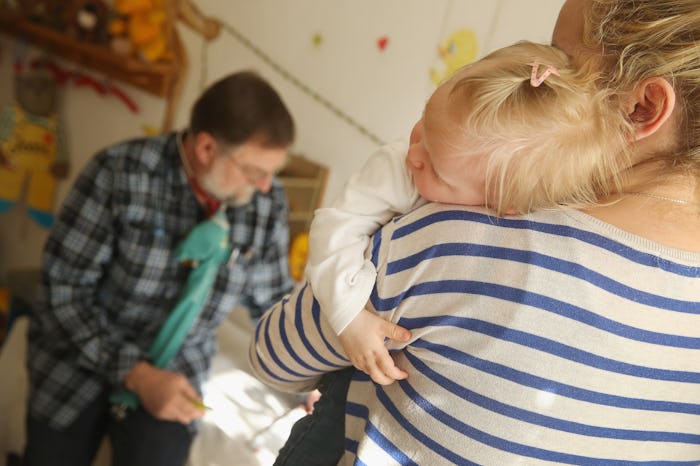Life

The Number Of Parents Refusing To Vaccinate Has Increased, According To New Study
With schools opening their doors for yet another school year, parents can be ready for plenty of coughs and colds to follow their students home. Thankfully, in this age of modern medicine, most American parents don't need to worry about diseases like polio, smallpox, and meningitis catching a ride home on their child's backpack; we have Jonas Salk and other medical and scientific pioneers of vaccine development to thank for that. And yet, the number of parents refusing to vaccinate has increased, according to a new report released Monday from the American Academy of Pediatrics. The trends the report has identified over a seven-year survey period are startling.
In 2006, the AAP conducted a survey regarding pediatricians encountering parents who choose not to vaccine their children. At the time of this first survey, 75 percent of pediatricians encountered parents who refused a vaccine. A follow-up survey in 2013 revealed shocking results: that number had jumped to nearly 90 percent of all pediatricians who've met with a parent who refused a vaccine. In some ways, the surge in parents turning down vaccines shouldn't come as a surprise: The surveys happened to cover the exact same time period when actress Jenny McCarthy said "vaccines cause autism" in her books and on TV.
The AAP report isn't all bad news, however. It's important to note that during that same time period, of those parents who initially refused a vaccination, pediatricians were able to convince one-third of those parents to vaccinate their children. Likewise, a similar study found that pediatricians could convince nearly 50 percent of parents who initially refused vaccinations after engaging with the parents in discussion. This brings to light two very important points about both the anti-vaccination movement and the medical necessity for vaccinations.
First, the era of the false notion that "vaccines cause autism" isn't gone, despite mountains of research proving there is no link between vaccines and autism. Even when Andrew Wakefield (the doctor responsible for starting the vaccines cause autism link in a paper for Lancet in 1998) was stripped of his license to practice medicine and his paper discredited — still, anti-vax parents clung to their beliefs in the face of scientific proof. According to the AAP study, the second most common reason that parents refused vaccines? Parents had concerns about autism.
Second, parents have been shown to favor the advice of other parents, particularly among groups of mothers. A 2014 study out of Australia found that mothers placed a high amount of trust in other mothers' opinions and advice, particularly when it came to the recommendation of products. The researchers cautioned that negative word-of-mouth reviews could spread just as virally among mothers as positive recommendations. The AAP study would appear to support this assertion, given the rising number of parents refusing vaccines at the pediatrician's office.
The fact that many pediatricians are able to engage with parents about the positive, preventative benefits of vaccines and get them to vaccinate their children offers a glimmer of hope — but, as the AAP study also revealed, there's just as much work for the medical community to fight their way through a rising tide of vaccine hesitancy among parents, too.